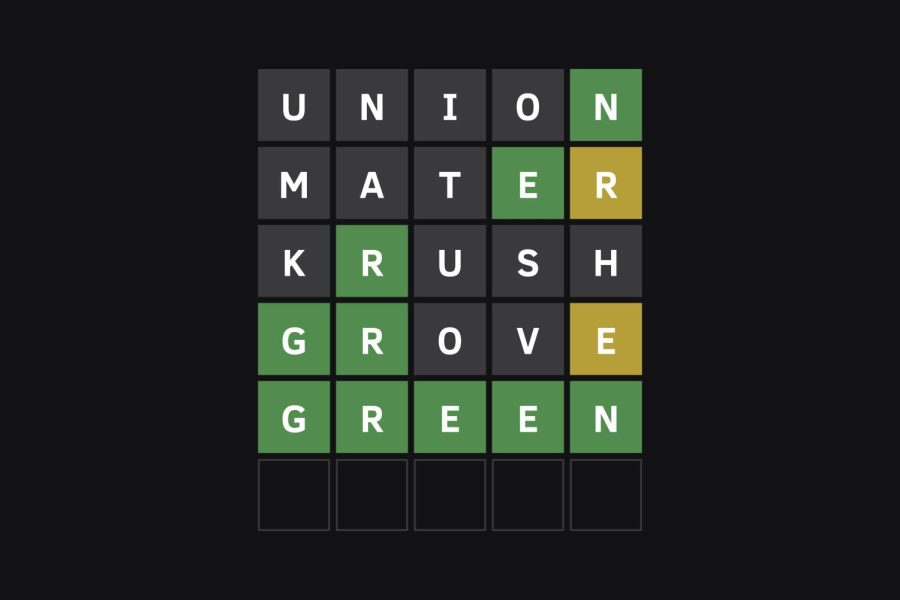Wordle craze spells fascination on campus
Feb 20, 2022
October brings an association with the beautiful warm colors of fall. Amber hues, comforting oranges, dirty yellows and bright reds cover a majority of campus. However, October also marked the creation of the now worldwide phenomenon known as Wordle. Designed by software engineer, Josh Wardle, and his partner, the app had only about 90 users by the end of November.
But by mid-January, the app would have about 300,000 daily users which would later reach millions by the end of the month. The sudden boom in popularity of the app led The New York times to buy the app, eventually filling everyone’s timelines across a plethora of apps, especially Twitter, with a mix of yellow, green and grey squares.
However, interestingly enough, while the app’s swift rise to success is nothing short of incredible, early statistics show that the hype behind the game isn’t quite big as it may seem. The most recent data from a survey conducted between Jan. 12 and 14 found that about 14% of U.S. adults play Wordle, compared to a much larger 46% who play Words with Friends and 52% who play Candy Crush.
Kira Matheson, sophomore in LAS, said she started playing Wordle a month ago. She said that although she doesn’t post her answers or progress on social media, she does share it with friends.
“I’d describe it as a short, word guessing game in which there’s a bunch of different ways to win,” Matheson said. “Getting from point A to point B is completely up to who is playing. Plus, it’s shareable — which is half of the fun.”
Get The Daily Illini in your inbox!
Many speculate that the ability to share your achievement without giving away the day’s word makes it a near-perfect, “bite-sized” game in an era of instant gratification, social media and reduced attention spans with the ever-increasing flood of content available for consumption.
Unlike most modern internet games and the very nature of social media, which is designed to keep players coming back multiple times a day, the structure of Wordle limits it to six tries a day for the same one word. Many have also compared the game to hangman, drawing lines between the simplicity to pen-paper games from back in the day.
“I like Wordle cause of its pace,” said Vishwanatha Mallampooty, barman and bookkeeper at The Literary. “One puzzle and one try a day. It means it’s spaced out and carries weight. I also like that I can talk to my friends about it cause everyone gets the same word, a benefit of the structure.”
Wordle also spawned several similar games, desperately trying to capitalize on the virality of the game: such as Worldle, a geography-inspired version of Wordle where players must correctly guess a country or region in six tries, and Quordle, a daily word puzzle game where players guess four words.
Another interesting aspect of the game is that each player has their own approach to getting the word right within the six tries they are given.
“I’d say I’m more of a strategist compared to most Wordle players,” Matheson said. “I’m a huge fan of using “x”s as placeholders to figure out letters & I always try and pick a start word with a good balance of basic consonants and vowels and eliminate my options from there.”
On the other hand, Mallampooty said he used words that he knew were wrong but were made of the maximum possible uncommon letters that he believed to be wrong. Others use words like ‘adieu’, ‘crane’ and many other five-letter words to start themselves off each day.
Pranav Handa, a senior in Engineering, close friend and roommate of Mallampooty, was also recently put onto the game. Being in such close vicinity to a regular player rubbed off on him and prompted him to pick up the game on his own.
“I started five days ago, so I’m still a newbie,” Handa said. “I don’t share it to any of my social media but I do talk about it with people every day. It’s fun to see how different people eliminate different options.
“It’s like a new-age newspaper game but online and easy to learn and play.”
Regardless of how players play the game, Wordle’s popularity successfully created a sense of community — millions of users trying to guess the same word once a day.
Matheson explained how it was a good way to keep in touch with her mom every morning.
“I love Wordle because I can play with my family back home,” Matheson said. “I’ve grown up playing word games so it’s nice to be able to continue the tradition long distance.”






